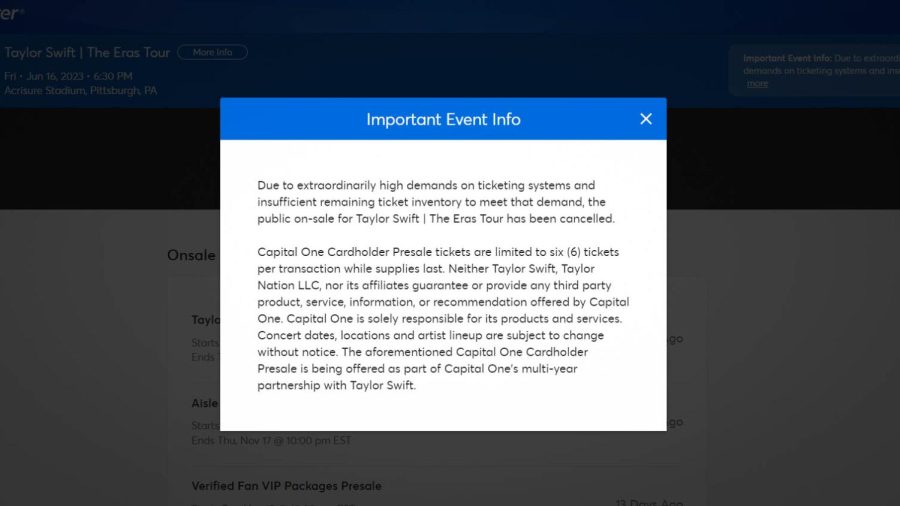Ticketmaster Crash Leaves Taylor Swift Fans Fuming
Ticketmaster’s Website now includes this explanation for why tickets to Swift’s Eras Tour are no longer available.
November 30, 2022
Live Nation Entertainment, Ticketmaster’s parent company, is now being investigated by the US Department of Justice and facing backlash online by ticket buyers all over the world, in lieu of Taylor Swift’s upcoming The Eras Tour ticket fiasco.
Taylor Swift announced her tour and its upcoming presales on November 1. As usual, she shared that she would be using Ticketmaster to sell tickets. This time, though, it didn’t turn out exactly as planned.
Ticketmaster invited a whopping 1.5 million people to Swift’s tour’s presale, and as a result many of the invited fans were unable to purchase tickets. Additionally, because of the large number, the site experienced record numbers of traffic and crashes.
Ticketmaster also only required fans’ presale codes at the time of checkout, so anyone was able to enter queues, causing 14 million people on the site and over 3.5 billion system requests. This caused the waiting times for fans to be hours long, so many didn’t even receive their tickets.
“It was long. It took an hour to be able to even see the prices of the tickets,” says freshman Sahashra Pinnoji, who wasn’t able to get tickets to Swift’s Pittsburgh show.
Even then, the prices reached up to thousands of dollars. Pinnoji explains, “The tickets were very expensive, so I was not able to buy any.” Many fans experienced the same disappointment, as Ticketmaster hiked up the prices of tickets to the point that even the worst seats began to cost hundreds of dollars.
Sophomore Kendall Graham was also one of the fans planning on attending Swift’s Pittsburgh show. “I wasn’t actually waiting in the queue; my mom was. I was anticipating and waiting for her to text me how many people were in front of her,” she says. The anticipation turned into disappointment though, as she was unable to purchase tickets.
Prices seem to have been one of the biggest problems during presale, however, Swift opted out of dynamic pricing for her tour, meaning that prices shouldn’t have fluctuated based on demand. She announced prior to ticket sales that seats would cost $49 to $899. This is yet another thing that Ticketmaster appears to have messed up.
Then, to make matters worse, on November 17, two days after the chaotic presale, Ticketmaster announced the cancellation of the general public onsale. They shared that they had sold too many tickets during the presale, 2.4 million to be exact. Swift’s last tour sold just over 2 million tickets, according to Billboard.
Graham says, “It was really unfair to the people that didn’t get tickets, and Ticketmaster did say they were only going to be selling 15 percent of the tickets.” As if they hadn’t already done enough during the presale, this made fans even more angry and upset because for many, this was their final chance at scoring seats. “I felt sad because that was my last option to get tickets,” says Pinnoji.
This whole ticketing disaster put Ticketmaster in the spotlight, and it was later announced that the Justice Department opened an antitrust investigation into the owner of Ticketmaster, Live Nation Entertainment. However, the investigation is said to predate The Eras Tour.
Ticketmaster holds a virtual monopoly over the ticketing industry, and many artists choose them to sell their tickets. For almost all events, Ticketmaster is the one place you go to buy your tickets. This may seem convenient, but it also means that any other competition is prevented. In turn, Ticketmaster is able to raise prices and scam fans without them having any other choice. This isn’t new, as Ticketmaster has caused controversy for the same reasons in the past.
This time around, Swift’s tour sale was downright catastrophic, as her fans “went through several bear attacks” to get tickets, as she reported in a statement. The presale process was draining and disappointing for everyone, and Live Nation Entertainment should be broken up for its abuse of power in the live music industry.












